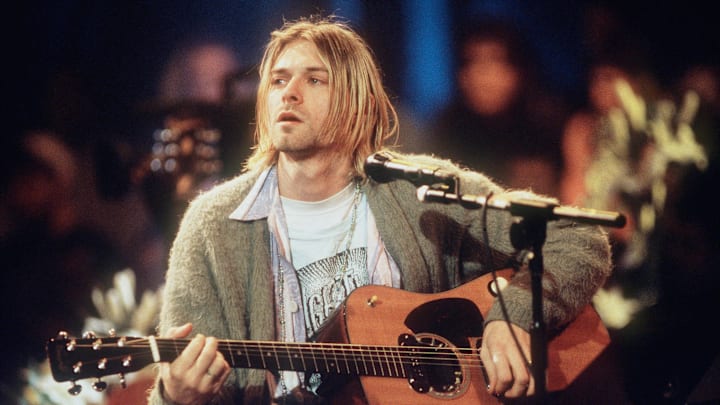[WARNING: I discuss suicide and other dark themes here, including anecdotes from my own personal life. If you need help, you can call the 988 Suicide & Crisis Lifeline.]
This will probably be among the most controversial pieces I will write. Still, sometimes I wonder: Could anything have prevented Kurt Cobain's death? Similarly, could his story be used to prevent similar tragedies? What about his access to the gun? At the very least, I think there are some partial answers...and no, I will not bother delving into the conspiracy theories surrounding this tragic loss.
Now, I hesitate to write about his death because, for one thing, it quite simply cannot be undone. Also, it's so easy to be accused of exploiting a tragedy to advance my writing career (such as it is). However, what I can say, in all honesty, is that I am a Nirvana fan.
In fact, In Utero was one of the first cassette tapes I bought when I first got into music (the other album I bought on the same fateful day: Offspring's Smash). I also wanted to wait until after the anniversary of his death to write more specifically about it, toI feel a little less like a media shark at a tragedy feeding frenzy.
I should mention: I have lost people I know due to suicide, and even when you don't know the person that well, it's no picnic. So, technically, these questions are never just about Kurt Cobain, or any other famous person who committed suicide (or self-harm in general). People may relate to these stories because, in some cases, maybe we know someone like that. In fact, maybe we are that person who has dealt with such deep, dark depression.
On that note, I will share a not-so-fun fact about me: My father was a bipolar, alcoholic Vietnam vet who regularly threatened to either shoot himself or go on shooting sprees. So, knowing that, you might better appreciate how this story has a few slight personal connections. Let me put it this way: When and where I went to high school, students could legally keep their hunting rifles in their cars while going to class — yet my dad still once had his own firearm confiscated due to a concerned neighbor calling the cops. Yes, that's how serious it got, and it's partly why I relate to morbid topics like this.
What if Kurt Cobain never had the gun?
As I address the gun issue, something else needs to be noted: The complexity of Kurt Cobain’s tragic death lies in various factors. It's difficult to determine if he would have ended his life through another means if he had not learned to use a gun. Cobain, the frontman of Nirvana, a pioneering band in the grunge music scene, grappled with severe depression, chronic pain due to a stomach condition, and substance abuse, in addition to fame-related stress. These factors profoundly influenced his mental state.
Access to a firearm may have made it easier for Cobain to act on his suicidal impulses, yet predicting whether he might have taken his life otherwise remains speculative. Cobain's struggles underscore the intricate interplay between mental health issues and the availability of means to self-harm.
"The feel-good neurotransmitters," dopamine and serotonin, play a crucial role in mood regulation, and imbalances can contribute to depression, further complicating his situation. In other words, depression is not necessarily always "triggered" by a clar, specific event. This often has more to do with brain chemistry than something being obviously wrong in a person's life. That's why suicie can happen even to people who seemed perfectly happy, perhaps even right around the time of the occurrence.
What more could be learned from the death of Kurt Cobain?
There are lessons to be learned from the tragedy of suicide: Mental health interventions, support systems, and coping mechanisms can be crucial for treating individuals experiencing suicidal thoughts.
And I have to emphasize: While Cobain might have followed a different path had he received more effective support or treatment, determining alternative outcomes with certainty is challenging due to the numerous variables at play. However, I can responsibly say that Cobain’s case highlights how vital comprehensive support systems are in potentially altering the trajectory of those struggling with similar issues.
Of course, we talk about Kurt's death because he was famous, and his music still resonates today. Nirvana, with hits like "Smells Like Teen Spirit" and "Come As You Are," revolutionized rock music in the early 1990s. Cobain's raw and emotive songwriting connected deeply with fans, making him an icon of his generation. Despite his public success, his private battles were immense, illustrating the often underused role of mental health support in the lives of even the most successful individuals.
Final thoughts
Ultimately, while exploring "what-if" scenarios can provide insight into the factors that contribute to tragic outcomes, it remains a somewhat underutilized area in the literature — perhaps rightly so — regarding influential figures like Cobain. The "too ugly" reality of his mental health struggles and the impact of his environment should drive efforts to understand and mitigate similar issues in others, emphasizing the need for robust mental health care and support systems.
As fans have noted, this song and video linked below take on a darker tone in light of Kurt's eventual end. Still, who's to say it's not some unhappy coincidence? That aside, it also pays to step aside from this issue and look at his legacy as a whole. After all, tragedy isn't everything, and dwelling on it too much is...well, dwelling on it too much. So maybe just enjoy this song because it's good!
